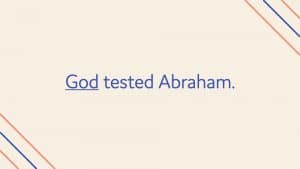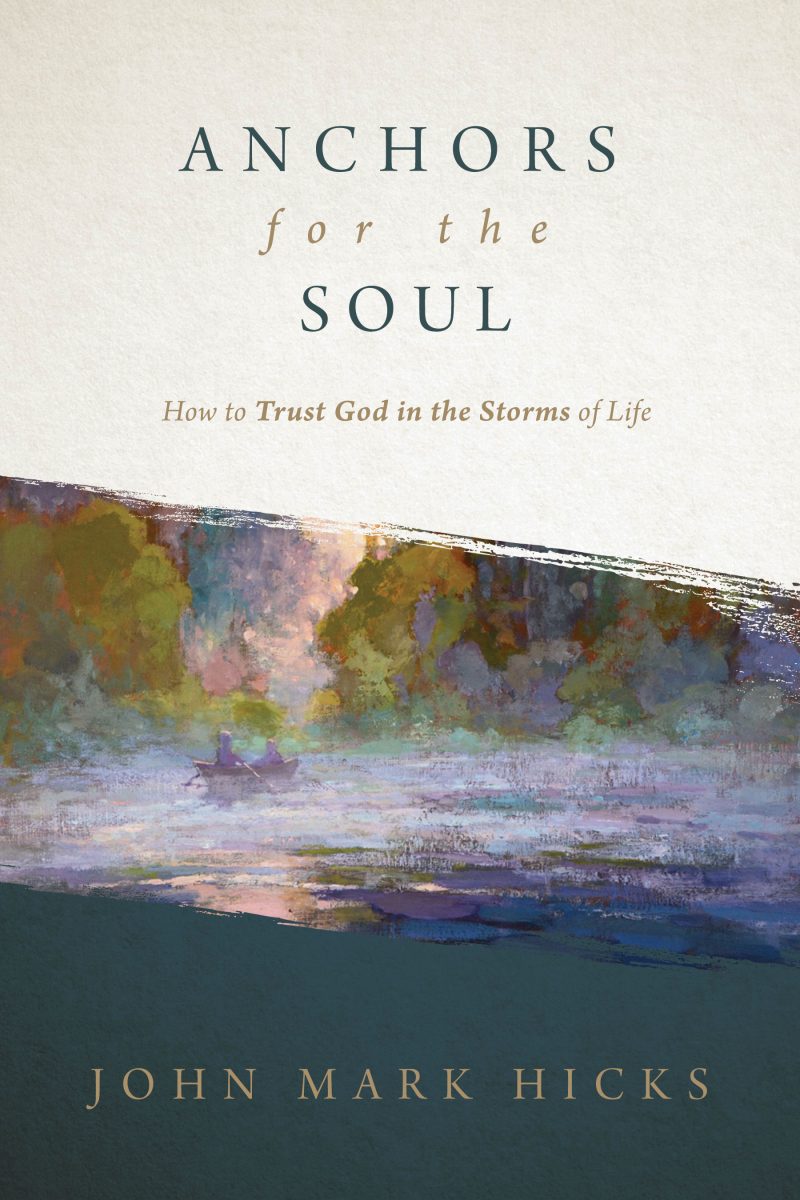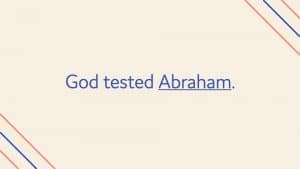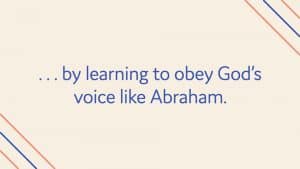The following is a sermon preached on July 19, 2020 at Harpeth Christian Church in Franklin, Tennessee. You can listen to it on the HIM Publications podcast here or watch it on YouTube here.
Before we get into our text for today, let’s review where we’ve been. In recent weeks, we’ve seen how Abraham’s story unfolds as he awaits the fulfillment of the promise that God would make him into a great nation. He received this promise when he was a lot younger, and God has been forming him all along. Then, he finally had a son at the age of one hundred—and there’s hope on the horizon.
But God wanted to take Abraham even deeper in relationship with him. So, in Genesis 22, he’s not done with Abraham yet, and he’s not done with us either. We’ve got more to learn before the end of our story.
In Genesis 22:1–19, God takes Abraham through the wringer by the ultimate test of obedience, one that challenges us, especially parents, to our core. Genesis 22:1 begins the story. I’ll be reading from the New Revised Standard Version, and I’m going to be walking through this verse-by-verse gleaning along the way because this is such a rich passage.
1 After these things God tested Abraham. He said to him, “Abraham!” And he said, “Here I am.”
Abraham was living in the land of the Philistines, it says in Genesis 21, for “many days.”
Then, God tests him.
It’s like, really, God, is this necessary?! I thought we had all this worked out!? I thought waiting for a son was the major test of my life!
It’s interesting: It says God tested Abraham.

It’s important to know when it’s God, Satan, the world, life, or just our own flesh tempting us. So, if you’re wondering if God is testing you right now, I’ve come up with a series of questions to help you decide:
God might be testing you if:
1. Your name is Abraham and your son’s name is Isaac.
2. You are part of a newly formed nation called Israel, leaving Egypt, and you find yourself a nomad wandering through the desert for forty years.
3. Your name is Philip and Jesus asks you how you’re going to feed 5,000 people for dinner—tonight.
It’s not often that God tests a person—and they know they’re being tested. In this text, it doesn’t say, Abraham knew he was being tested. We know he was because it says it, but it wasn’t like God said, “Abraham, I’m not going to test you.” And Abraham was like, “Okay, let’s do this.” He simply said, “Abraham!” And Abraham said, here I am.
So, we must be careful to say that God is specifically testing us. Because, in fact, there are four major kinds of “tests” found in Scripture, and I’ve listed them here for reference:
- We “test” ourselves: James 1:13–14, “When tempted, no one should say, ‘God is tempting me.’ For God cannot be tempted by evil, nor does he tempt anyone; but each one is tempted when, by his own evil desire, he is dragged away and enticed.”
- Living in the world tests us: Luke 8:13 (see also Mark 4:16–17), “Those on the rock are the ones who receive the word with joy when they hear it, but they have no root. They believe for a while, but in the time of testing they fall away.”
- The devil can test us: Job 1–2; Rev. 2:10, “Do not be afraid of what you are about to suffer. I tell you, the devil will put some of you in prison to test you, and you will suffer persecution for ten days. Be faithful, even to the point of death, and I will give you the crown of life.”
- God can test us: Gen. 22; John 6:5–6, Jesus tested Philip before feeding the 5,000.

John Mark Hicks’ Anchors for the Soul
How to Trust God in the Storms of Life
This book is the perfect resource for a reading group or church class. It combines rich Bible study with a personal narrative of living through devastating storms. John Mark Hicks is a trustworthy guide for the storms that lie ahead.
— Leonard Allen, Dean of the College of Bible and Ministry, Lipscomb University
I highly recommend Anchors for the Soul to individuals and groups who want to explore what it means to trust God despite this life’s suffering and pain. John Mark’s vulnerable testimony resonates and gives hope for the storms of life.
— Dr. Sara Barton, Pepperdine University Chaplain, Malibu, CaliforniaGet Product
It’s important to remain humble, because sometimes no one is testing you and life is just hard and it feels like a test.
Let’s look at how Abraham handles his test from God specifically so we can learn how to walk through trials in general.
What we can know is this: that God’s goal for us in testing is to become mature.
In James 1:2, it says: “Consider it pure joy, my brothers, whenever you face trials of many kinds” (Jam. 1:2). Why is this joyful? Because, he goes on, “You know that the testing of your faith develops perseverance. Perseverance must finish its work so that you may be mature and complete, not lacking anything” (Jam. 1:3–4). So, it’s clear that the goal of all kinds of testing is our maturity.

Then, notice it says “God tested Abraham,” the man.
It doesn’t say “Then, God tested Abraham’s faith.” It says that God tested Abraham, the man, which shows that this is deep. God didn’t just want Abraham’s faith up here in his head, and his heart over here, or his actions over there. God wanted Abraham, the man—the whole person, every part of him—so it says “God tested Abraham.”
2 He said, “Take your son, your only son Isaac, whom you love, and go to the land of Moriah, and offer him there as a burnt offering on one of the mountains that I shall show you.”
Wow, this is a test of all tests: to literally sacrifice his son. God says “your son, your only son,” which is the same phrase used of Jesus in John 3:16.
3 So Abraham rose early in the morning, saddled his donkey, and took two of his young men with him, and his son Isaac; he cut the wood for the burnt offering, and set out and went to the place in the distance that God had shown him.
Notice how Abraham obeyed immediately: early in the morning it says. God commanded him to act, and the very next day, early in the morning he obeyed. He didn’t even wait until after his morning coffee. He was the kind of man who obeyed immediately, and we should be that way too because…
Delayed obedience is disobedience.
And that’s important because obedience makes us mature.

My main point today is this: Trials offer us an opportunity to mature.
To become better off than before we were tested, so let trials mature you. In order to do this, we have to, like Abraham, obey God. Here’s how it works: God speaks, we obey, God changes us.
4 On the third day Abraham looked up and saw the place far away. 5 Then Abraham said to his young men, “Stay here with the donkey; the boy and I will go over there; we will worship, and then we will come back to you.”
This is quite the trek! He journeyed from the land of the Philistines to the region of Moriah. This would have been 30–60 miles, depending on where he started, and would have taken roughly 20 hours, and he would have experienced an elevation change of roughly 2,500-feet as he, Isaac, and his two servants ascended to the place God showed him to set up the altar for Isaac.
6 Abraham took the wood of the burnt offering and laid it on his son Isaac, and he himself carried the fire and the knife. So the two of them walked on together. 7 Isaac said to his father Abraham, “Father!” And he said, “Here I am, my son.” He said, “The fire and the wood are here, but where is the lamb for a burnt offering?”
Let’s talk about Isaac’s faith here for moment. When we’re going through a test, it’s not just our faith that’s under fire; it’s also the faith of those around us, like our family, that’s being tested. So, when you’re going through a test, consider what sort of legacy you are leaving.
What kind of father was Abraham that his son Isaac would not run in the complete opposite direction? What kind of mother was Sarah? They had their issues and doubts—they weren’t perfect—but they had instilled faith into their son Isaac, which I’m sure helped him trust Abraham with this questionable situation.
8 Abraham said, “God himself will provide the lamb for a burnt offering, my son.” So the two of them walked on together.
We’re going to come back to this, but just notice Abraham’s faith. The author of Hebrews writes about Abraham’s faith in this moment: “Abraham reasoned that God could raise the dead” (11:19). And that’s before the resurrection of Jesus ever happened! What amazing faith.
9 When they came to the place that God had shown him, Abraham built an altar there and laid the wood in order. He bound his son Isaac, and laid him on the altar, on top of the wood.
Abraham bound Isaac with rope like he was hog tying him. This just got interesting. Isaac’s now in total panic mode. Dad, I knew you said God would “see to it,” but I didn’t think you meant I was the “it”!
The truth is, we don’t know how Isaac responded emotionally, but we know he didn’t run away. I think Isaac had faith too.
10 Then Abraham reached out his hand and took the knife to kill his son. 11 But the angel of the LORD called to him from heaven, and said, “Abraham, Abraham!” And he said, “Here I am.”
12 He said, “Do not lay your hand on the boy or do anything to him; for now I know that you fear God, since you have not withheld your son, your only son, from me.”
Now, this was probably quite the moment, right. From a human standpoint, this is one of the strangest moments of the story of God: God says to kill your son, and then last minute, he says, “Wait, no, no don’t do it—don’t touch him, don’t do anything.” I’m confident that Abraham was tempted to feel like he was losing his mind in that moment.
But notice what he says here in response: “Here I am.” This is an important moment because it shows what his posture was.

This little phrase “Here I am,” is the language of obedience for servants of God throughout biblical history.
- It’s what Moses said to God, when God called to him from the burning bush in the Midian desert, “Moses, Moses,” and Moses said, “Here I am.” (Genesis 3:4).
- It’s what Samuel said to Eli in the middle of the night, when it was actually God who was calling Samuel’s name. Three times that night Samuel popped out of bed—from asleep mode—and answered “Here I am” (1 Samuel 3:4).
- Then, here in Genesis 22 Abraham says it three times. He had a heart of obedience that he expressed with the words “Here I am.”
The main point I want to draw out today is that trials offer us an opportunity to become stronger, and the way we become stronger is by exercising our obedience muscles. So let me give you a tool you can use to teach yourself first-time obedience before you even know what God is going to ask of you: say the words “Here I am.”
Church, let’s be a people who say, “Here I am” to God.
- When we might lose your job and God calls out to you with a new plan, say, “Here I am, God, ready to obey.”
- When your child wanders from the faith and God calls out to you to not lose heart, say, “Here I am, God, ready to obey.”
- And when you wake up in the middle of the night and God calls your name, say, “Here I am, ready to obey.”
Whatever God speaks to us, may we be people who are ready to obey at the drop of a hat, before we even know what God is going to ask us to do. Because the moment comes for all of us when we enter the fire, and the question is simply this: Will you be ready to obey God? That’s all that matters.
13 And Abraham looked up and saw a ram, caught in a thicket by its horns. Abraham went and took the ram and offered it up as a burnt offering instead of his son.
At the very moment when we are the most confused, dismayed, and even in the dark, God has the ability to do a complete reversal out of nowhere.
My Story
I know 2020 has been a tough year for many people. In fact, some of you might feel like this year has been one major test for you!
I can relate. I don’t think God is testing us all, but maybe he is. We don’t know. As I mentioned, we usually don’t know when we’re in the midst of it, but we can choose what to do in the midst of it: to obey God. To hear, obey, and be transformed.
This year for me has been one of the most difficult years in my life, because my wife, Rachel, and I lost our daughter Katharine on June 2nd this year, when she was stillborn. I knew it was going to be hard to share this, because we’re still in the midst of it, but we wanted to talk about our suffering to invite you into our journey.
You know, the testing of our faith happens when we least expect it. We were so happy with our first, healthy daughter, Emma Rose, who is now 21 months old, and we thought that God would bless us with another healthy child. But on February 12 of this year, during our routine 20-week checkup, our midwife looked at the ultrasound and said she was very concerned about our baby. That was a hard day.
Five days later, we received the test results back, and it was conclusive: our baby had been diagnosed with a lethal genetic disorder called Trisomy 18, and she stood no chance at a normal life. Most babies with Trisomy 18 die within weeks of birth, if they survive through birth at all.
We were devastated at this news, and for the next three and a half months while Rachel was pregnant during the pandemic, we grieved, wept, mourned, and even questioned God, “How could this happen?”
Now, let me be clear that I don’t think God was testing me or my family, but it was a test of our faith, no doubt. And we look to God in these difficult moments, because we know that God reigns sovereign over the flood, as Psalm 29:10 teaches.
We asked God to heal her.
But he did not.
We ask God if only we could hold her alive, even if for a few moments.
But we never got to hold our Katharine alive because she died shortly before she was born at 2:52 am on Tuesday, June 2nd. We buried our daughter this year—something we never thought we’d have to do—and said goodbye to her until we see her again in heaven.
*I know everyone’s story and suffering are different and we’re not through it yet, but I want to share with you what I’m learning in case it’s encouraging to those of you going through a difficult time:
God doesn’t take away the mystery by explaining it, he doesn’t take away the pain by dismissing it; but he offers his presence in the midst of it… if we have the eyes to see him.
Notice that this passage says in verse 13, “And Abraham looked up.” And he saw the provision of the Lord, even in his trial.
14 So Abraham called that place “The LORD will provide”; as it is said to this day, “On the mount of the LORD it shall be provided.”
I don’t know why God let our daughter die. I have no answers. But I can say this: God was present with us in our pain, and he still is. I can’t tell you how he might show up for you or when, but I can tell you how he showed up for us. I can literally enumerate the overflowing love of God. Obedience for us was simply holding on, and as we held on, God provided.
He showed up for us from the beginning to the end, carrying us along. He showed up:
- Through the encouragement of friends when we needed it.
- By giving us guidance on how to make decisions.
- He showed up to help us navigate the uncharted territory of losing a child.
- He provided us with a doula who specializes in helping couples with infant loss—through a miraculous connection.
- He showed up for us through the dozens of you who brought us food, mowed our lawn, wrote cards, sent us messages, and simply sat with us.
He showed up through the church.
Look, the world doesn’t have that kind of support; it’s only Christ in the church that offers that sort of provision.
But you know what meant the most? When God himself manifest his presence in a personal way to us in our darkest moments—simply with his presence.
And I’ll tell you that God showed up in that hospital room in the very darkness of our pain. In the night when Katharine was born, we experienced God in that room, even in our grief. We can’t explain it, but it was real.
As I said, God often doesn’t take away the mystery or the pain, but he offers us his presence.
That’s what God does, and he does it time and time again—for those who have eyes to see him.
So, church, have eyes to see God so that you can, like Abraham, perhaps see him provide when all hope feels lost.
Let me encourage you with this: Look for God in your trial. Keep your eyes open.
Because when we have eyes to see him, the mystery doesn’t go away but it can somehow become beautiful.
And God can make us beautiful through it too. That’s the amazing part. What did this look like in Abraham’s life? Let’s look at what happened next:
15 The angel of the LORD called to Abraham a second time from heaven, 16 and said, “By myself I have sworn, says the LORD: Because you have done this, and have not withheld your son, your only son, 17 I will indeed bless you, and I will make your offspring as numerous as the stars of heaven and as the sand that is on the seashore. And your offspring shall possess the gate of their enemies, 18 and by your offspring shall all the nations of the earth gain blessing for themselves, because you have obeyed my voice.”
Look at verse 18: “by your offspring shall all the nations of the earth gain blessing for themselves.”
This is a prediction of the messiah Jesus.

1. We can enter the blessing of Abraham…
by joining the Great Commission of making disciples of all nations. It’s every nation on earth by helping them know God through obedience to Jesus. This points to the Great Commission, where Jesus commands his apostles to make disciples of all nations. Don’t miss out on the gift you can provide by discipling others.
How do we enter this blessing?

2. By learning to obey God’s voice like Abraham.
Notice it says to end verse 18: “because you have obeyed my voice.”
I don’t think this trial was the first time Abraham had heard God’s voice. He was formed to hear it. This is an important point in preparing for and walking through trials. Take the opportunity now to learn to hear God’s voice so that you become strong in obedience.
19 So Abraham returned to his young men, and they arose and went together to Beersheba; and Abraham lived at Beersheba.
And finally, the resolution of the story: Abraham stayed in Beersheba.
Life is not constant testing. It’s moments, and through consistent, first-time obedience to the Lord’s voice, we can be ready whenever those moments may come, especially when we are “Here I am” kind of people.
But here’s the truth: none of us has perfect faith. I’m on a journey; you’re on a journey. Abraham was not always strong.
Even though we grow, and face trials, Jesus is always the author and perfecter of our faith.
He was the lamb that God provided, he was the perfect sacrifice. We look to him, we learn from him, and we lean on him.
Communion
The story of Abraham and Isaac is beautiful because there’s a gaping hole right in the middle of the narrative: “God will see to it about the sacrifice,” Abraham said. Yes, God provided a ram that day, but if you’re paying careful attention, that’s not what Abraham said would happen. Abraham said, “God himself will provide the lamb for the burnt offering,” but it was a ram. Now, at first blush this is just a minute detail, but I think it’s profound.
The place on which Abraham sacrificed this ram became the Temple mount in Jerusalem, where all of Israel came to offer sacrifices. But the real sacrifice, which atones for sin for God’s people, was not any other animal but a lamb. But even though the priests offered lambs for sacrifice, they had to do it time and time again.
It was never enough. That is until God complete his promise to his people by sending Jesus. Hebrews says, “Unlike the other high priests, he does not need to offer sacrifices day after day, first for his own sins, and then for the sins of the people. He sacrificed for their sins once for all when he offered himself (Heb. 7:27)”
The beauty of the cross is that Jesus fulfilled the ultimate test. God gave his one and only son, and he did die as “the lamb of God, who takes away the sin of the world” (John 1:29).
So, as we take communion today we remember that he took our sins, but also he show us how to walk through a trial and remain faithful to the end—no matter the cost. We look to him, the author and perfecter of our faith, asking God,
Would you please make me faithful to obey like your son Jesus did?
Would you please forgive me when I am faithless?
We rest on you, Jesus, our sacrifice.
Subscribe to HIM Publications here to get blogs like these delivered to your inbox.


Thank you, Chad, for this powerful charge of hope and activation to a life of Abrahamic faith – faith that instantly and instinctively obeys, faith that tightly clings to the conviction of God’s ability to do the impossible to fulfill every promise ever made, faith that leads to immeasurable blessing in the world and simultaneously within as more and more people trust and follow King Jesus to the glory of God. As we approach the two year anniversary of our daughter’s passing on, this word from God through you is both soothing and strengthening.
Thanks, Jeff! I appreciate your comment here. I’m encouraged by your faith and ability to talk about your daughter’s passing. Thanks for walking with me during this time, even if at a distance. I feel the love, brother!